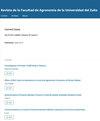Biochemical response of Ocimum basilicum L. inoculated with Rhizophagus fasciculatus as a NaCl-stress mitigator
IF 0.5
4区 农林科学
Q4 AGRONOMY
Revista De La Facultad De Agronomia De La Universidad Del Zulia
Pub Date : 2022-11-24
DOI:10.47280/revfacagron(luz).v39.n4.08
引用次数: 0
Abstract
Basil (Ocimum basilicum L.) is a medicinal and aromatic plant of commercial interest; it can be grown in salinized soils by applying a stress mitigator. The objective was to evaluate the biochemical response of two basil varieties inoculated with AMF Rhizophagus fasciculatus and appraise its usefulness as a NaCl-stress mitigator. A completely randomized design with a factorial arrangement, four replicates per treatment and four plants per replicate was used. Three factors were considered, (1) two basil varieties (Napoletano and Nufar); (2) three NaCl concentrations (0, 50 and 100 mM); and (3) R. fasciculatus inoculum absence or presence (0 and 10 g). The variables evaluated were a substrate chemical analysis; shoot (STP) and root (RTP) total protein content; shoot (SP) and root (RP) proline content; shoot (SGA) and root (RGA) glutathione peroxidase activity; spore count and colonization. The spore content was 50 to 70 spores per gram of inoculum. The STP and RTP were highest in both varieties in 0 mM with AMF and decreased in Napoletano in 100 mM. The SP and RP were highest in Nufar in 50 and 100 mM with AMF and lowest in Napoletano in 0 and 50 with AMF. The SGA and RGA were highest in Napoletano in 50 and 100 mM with AMF. The colonization was high; however, decreased as NaCl increased. These results suggest that inoculation with AMF has a positive effect to mitigate NaCl-stress and a biochemical benefit for basil plants.用束状根噬菌(Rhizophagus fasculatus)接种basilicum L.对nacl胁迫的生化响应
罗勒(Ocimum basilicum L.)是一种具有商业价值的药用和芳香植物;它可以在盐碱化的土壤中种植,施用胁迫缓解剂。目的是评价两个罗勒品种接种AMF根噬菌后的生化反应,并评价其作为nacl胁迫缓解剂的有效性。试验采用全随机设计,每个处理4个重复,每个重复4株植物。考虑了三个因素:(1)两个罗勒品种(Napoletano和Nufar);(2) 3种NaCl浓度(0、50、100 mM);(3)接种量不存在(0和10 g)。评估变量为底物化学分析;茎部(STP)和根(RTP)总蛋白含量;茎部(SP)和根(RP)脯氨酸含量;茎(SGA)和根(RGA)谷胱甘肽过氧化物酶活性;孢子计数和定植。孢子含量为每克接种物50 ~ 70个孢子。两个品种的STP和RTP在AMF作用下均在0 mM最高,在100 mM纳波利塔诺降低。SP和RP在AMF作用下在50和100 mM努法尔最高,在AMF作用下在0和50 mM纳波利塔诺最低。在AMF作用下,50 mM和100 mM纳波莱塔诺的SGA和RGA最高。殖民化程度很高;但随NaCl的增加而降低。上述结果表明,接种AMF对罗勒植株具有缓解nacl胁迫的积极作用和生化效益。
本文章由计算机程序翻译,如有差异,请以英文原文为准。
求助全文
约1分钟内获得全文
求助全文
来源期刊
CiteScore
0.50
自引率
0.00%
发文量
45
审稿时长
>12 weeks
期刊介绍:
La Revista de la Facultad de Agronomía de la Universidad del Zulia publica artículos científicos, notas técnicas, comunicaciones rápidas y artículos invitados originales e inéditos, es decir, que no hayan sido publicados ni enviados simultáneamente a otra revista para su publicación, de autores interesados en el campo agrícola vegetal y agrícola animal. De presentarse el caso que el autor o autores hubiesen enviado o publicado su manuscrito simultáneamente en otra revista, podrán ser sancionados con la no publicación en esta revista por tiempo indefinido.
Se admiten manuscritos escritos en idioma Español, Portugués o Inglés, con un resumen en Español o Portugués y otro en Inglés (Abstract).

 求助内容:
求助内容: 应助结果提醒方式:
应助结果提醒方式:


